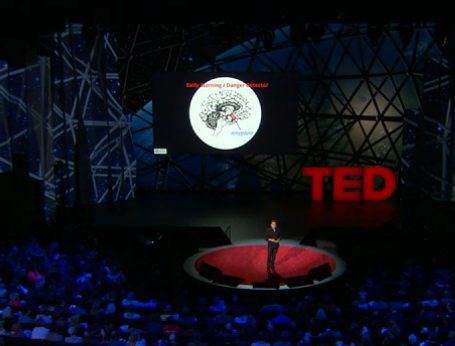(Video) Announcer: Threats, in the wake of Bin Laden's death, have spiked.
(視頻)播音員:在本拉登被擊斃后,恐怖威脅數量激增。
Famine in Somalia. Announcer Three: Police pepper spray.
索馬里出現饑荒。警察使用胡椒噴霧。
Vicious cartels. Caustic cruise lines. Societal decay.
兇惡的毒梟。破裂的游輪。社會風氣敗壞。
65 dead. Announcer Eight: Tsunami warning. Announcer Nine: Cyberattacks.
65人死亡。海嘯警告。網絡攻擊。
Drug war. Mass destruction. Tornado. Recession. Default. Doomsday. Egypt. Syria. Crisis. Death. Disaster. Oh, my God.
毒品戰爭、大規模破壞、颶風、 經濟衰退、違約、末日、埃及、敘利亞、 危機、死亡、災難。 哦我的天哪!
So those are just a few of the clips I collected over the last six months -- could have easily been the last six days or the last six years.
這是我在過去6個月里 收集的一些視頻。如果是在6天,或者過去6年里,也可以輕易收集到類似的片段。
The point is that the news media preferentially feeds us negative stories because that's what our minds pay attention to.
重點是新聞媒體傾向于向我們灌輸負面信息。因為我們的大腦特別容易關注這些。
And there's a very good reason for that. Every second of every day, our senses bring in way too much data than we can possibly process in our brains.
當然大腦這樣做是有很重要的理由。每時每刻,我們的“傳感器”收集大量的信息,多到我們的大腦處理不過來。
And because nothing is more important to us than survival, the first stop of all of that data is an ancient sliver of the temporal lobe called the amygdala.
而其中沒有比與生存相關的信息更重要的。所有信息輸入的第一站就是顳葉上一個叫做大腦扁桃體的非常原始的部分。
Now the amygdala is our early warning detector, our danger detector.
大腦扁桃體是我們的早期預警偵測器,危險探測儀。

It sorts and scours through all of the information looking for anything in the environment that might harm us.
它將所有信息分類并仔細查閱,探測環境中任何可能的威脅。
So given a dozen news stories, we will preferentially look at the negative news.
所以每當我們打開報紙,就會不自覺地閱讀 各種負面信息。
And that old newspaper saying, "If it bleeds it leads," is very true.
那個過去有關報紙的說法:“流血事件必上頭條。” 其實是很有道理的。
So given all of our digital devices that are bringing all the negative news to us seven days a week, 24 hours a day,
而現在我們有各種數字化設備,無時無刻地向我們輸送各種負面新聞。
it's no wonder that we're pessimistic. It's no wonder that people think that the world is getting worse.
難怪大家這么容易悲觀。難怪人們覺得世界在倒退。











